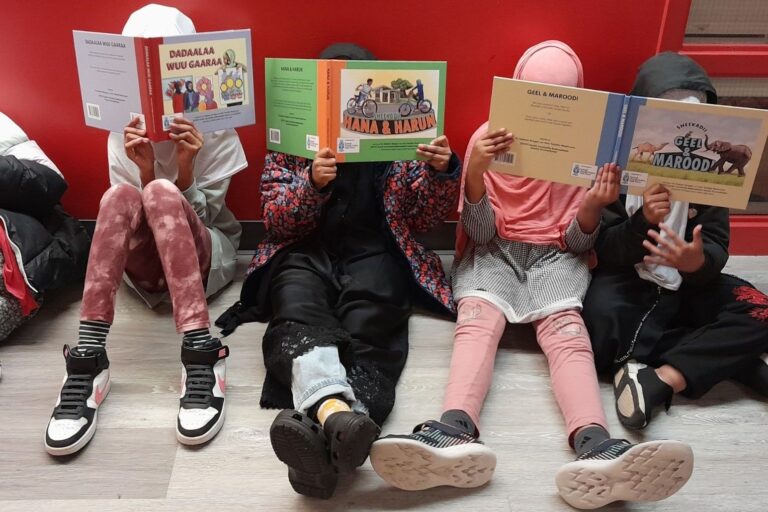Do you remember the last bedtime story you read to your child? Did the story’s characters look and sound like members of your family?
More than 500,000 immigrants and their children live in King County; finding stories that fit those parameters, especially for children, can be difficult.
Book launch event
In Somalia, for example, folktales and bedtime stories are traditionally shared through oral storytelling, rather than being written down. That’s part of the reason Somali American families are among the immigrant groups who struggle to access books in their native language, despite Somali being the second most spoken language in the Seattle Public School system.
But the Somali Family Safety Task Force is working to change that. The organization will release a series of new bilingual Somali-English books on Friday, January 27, during a special book launch event at New Holly Gathering Hall. The event begins at 5:30 p.m.
Language equity project
These new books are part of the the task force’s language equity project. The project launched in 2018 when the task force self-published three board books for preschool-aged children. Created over the course of six weeks that summer, the board books were developed in collaboration with local public libraries, schools, and the local housing authority.
The 2018 books teach the Somali alphabet, numbers and animals and can be found in the Seattle and King County public libraries, in school libraries and directly through the task force. Two of those earlier published preschool books are available electronically through Seattle Public Libraries website. They were designed with the help of five Somali families living in Seattle. All three books prominently feature artwork done by the children and families involved.
New books share traditional folktales
In contrast, the new books released this week feature traditional Somali folktales and were written collaboratively by a group of 14 local Somali community members.
“Our books empower parents to realize that they are their child’s first teacher,” explains Farhiya Mohamed, Executive Director of Somali Family Safety Task Force who initiated the project. “Some refugees and immigrants can’t speak English or read in their native language. We added audio versions so that every parent can sit and read with their child. We want our children to be proud of their culture and learn to speak their native language.”
Books from the Somali community for the Somali community
The task force focuses on the needs and strengths of the community, and this focus shines through all its projects. This was especially the case in the development of the children’s books. The language equity project aims to encourage and empower:
- children to be proud of their culture and learn to speak their native language
- intergenerational discussions within Somali families
- parents to realize their significant roles as their child’s first teachers
Recognizing an oral tradition through audiobooks
In keeping with Somalia’s oral storytelling tradition, the new books have been made available in audiobook format. The audio versions allow family members who may not read their native language to share traditional Somali stories with the new generation. Project leaders hope the books will prompt dialogue among family members and help parents to be more closely involved in their children’s education.
Connecting kids to their culture
While their parents work to assimilate into U.S. culture, some American-born children of immigrants only learn to speak English. Numerous studies have attempted to quantify the mental health impacts for immigrants who lose ties to their native cultures. Efforts aimed at cultural preservation and dissemination, such as the task force book project, are occurring around the country. In a similar project, the Minneapolis Public School District #1 sponsored the development of a bilingual collection of Somali folktales and published them online.
Dr. Thad Williams, International Education Administrator for Seattle Public Schools plans to be on hand for Friday’s book launch and said he lauds the Somali Family Safety Taskforce and Farhiya Mohamed for working with Somali families to create the books.
“What an opportunity it will be for the district and students of SPS to be able to use them,” Williams said.
The importance of multilingual books
Williams says providing multilingual students books in their own language is important for many reasons. Accessing books in their own languages, affirms a student’s identity and recognizes being multilingual and multi-literate as an asset.
Multilingual books also provide students the opportunity to see themselves in the images, authorship, and words of the book, he said.
Williams added that project’s like the task force book development creates opportunities to make multi-generational connections with family and community members that speak the same language and keeps the language strong in the community. Not to mention when students learn to read in their own language, it strengthens English literacy skills and helps them to become stronger readers in all languages.
Williams said the plan for how the school district will use the book is not fully set.
“We anticipate they will be used in some of the after school Somali language programs happening in SPS, the Somali Heritage Language Course, and in partnership with families, schools and libraries,” he said.
For more information about the even or or to obtain copies of the Somali and Somali-English books, visit the task force web site.



